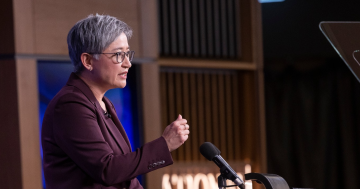Yolanda Redrup* says Ticketek will soon be using Chinese-style facial recognition technology for security and ticket-holder access to Australian events.

Photo: andresr
In less than five years facial recognition technology will become a core part of venue security and event-goers will no longer have to print tickets to access large venues like the Melbourne Cricket Ground (MCG), according to TEG Chief Technology Officer, Matt Cudworth.
The company, which owns ticketing, live entertainment and data analytics businesses including Ticketek, formed a ticketing joint venture with YongLe in China called YunTek in 2017 and Mr Cudworth said biometric security measures were already commonplace across Chinese venues.
In April it was reported that China’s facial recognition technology had been able to identify a fugitive in a crowd of nearly 60,000 people at the Nanchang International Sports Centre.
“YunTech has full facial recognition and fingerprint scanning at their facilities,” Mr Cudworth told The Australian Financial Review.
“It’s obvious from a security perspective that our large events need some form of facial checking.”
“We won’t be the owner of that technology, but we’re a key participant and the line is blurring between what data gets shared between participants.”
The Queensland Government put in place facial recognition software for the recent Commonwealth Games and it has not been removed.
The State Government rushed through legislation in time for the Games that allowed local police to match driver’s licence photos with security footage and it is expected other Australian States and Territories will pass similar laws.
Mr Cudworth said that, as well as enhanced security features, there would be a major shift in the way technology was used to “drive people into venues” within the next few years.
“There’s a move away from physical tickets to digital tickets and there’s a strong tech capability to tie that ticket to the appropriate people,” he said.
“With that in mind there’s a digital identity element and near-field communication capability that will come to market quickly.”
“We’re taking a multi-factor approach at Ticketek and we have a Ticketek identity project that we’re working on to let you use your mobile to get through turnstiles.”
“There’s no reason why tickets shouldn’t appear in your Melbourne Cricket Club app or the AFL app or the Cricket Australia app.”
“You’ll be able to interact with your accounts and receive your digital ticket without having to come to us.”
Tech integration
Earlier last month Ticketek released a Facebook Messenger chat bot and Mr Cudworth flagged upcoming integrations with Google Home and Amazon Alexa, which will enable event-goers to purchase tickets via these internet devices.
These innovations from Ticketek have only been made possible thanks to its “digital acceleration” push, which the company embarked on just over three years ago when it moved its systems to Amazon Web Services.
Internally the shift has been called “Ticketek Ignition” and Mr Cudworth said it had also involved it moving to an application programming interface (API) architecture and treating its IT vendors as partners.
“We did this to open up our platform and our mindset … with the goal of driving innovation through integration,” he said.
“We are in a rapidly accelerating consumer-driven environment and the ability to scale and share data with our partners was at the heart of this decision.”
“We couldn’t have built out our APIs or the platform in a private data centre.”
Hiring drive
The Ticketek Ignition project has resulted in the company growing its technology team by at least 50 per cent in just over three years and the business also adopting technologies from Cisco’s AppDynamics, MongoDB and most recently Dell Boomi.
Mr Cudworth said AppDynamics, which monitors the performance of a company’s applications and provides real-time analytics, was one of the first partners it started working with and was now part of Ticketek’s backbone.
“We knew we needed a platform that could move with us that wouldn’t just monitor CPUs or servers,” he said.
“Because our technology is moving so quickly now, we couldn’t just be looking at individual components.”
Mr Cudworth said the nature of its “digital acceleration” approach meant that its transformation journey would never be over.
But he said the next phase of the ticketing company’s digital agenda would be focused on data analytics.
Without its digital changes to date, Mr Cudworth said it would have been impossible to manage an event the size of the recent Commonwealth Games.
“The Commonwealth Games didn’t have the impost on the business it would have once had,” he said.
“Thinking back to doing load testing in production rather than in isolation, we had to deliver twice the previous Games traffic and prove it during production.”
“We could never have done that with our previous model.”
* Yolanda Redrup is a Melbourne-based journalist for The Australian Financial Review. She tweets at @YolandaRedrup.
This article first appeared at www.afr.com/.











